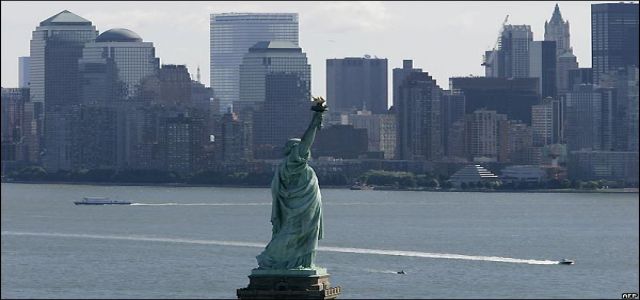|
|||||||||
| :: Issues > Election Coverage | |||||||||

US candidates are vague on Middle East democracy
While the heady days of the so-called Arab Spring of 2005 and the soaring rhetoric of President George W. Bush’s "forward strategy of freedom" are long past, the question of whether and how the United States should promote democracy in the Middle East is still debated.
|
|||||||||
| Monday, January 7,2008 18:17 | |||||||||
|
|||||||||
|
While the heady days of the so-called Arab Spring of 2005 and the soaring rhetoric of President George W. Bush"s "forward strategy of freedom" are long past, the question of whether and how the United States should promote democracy in the Middle East is still debated. Each of the prospective candidates for the 2008 US presidential election has, in one way or another, established a position on the issue. Bearing in mind that a new president"s actual policies are often shaped more by breaking events than by campaign rhetoric, there are already some observable differences. The six candidates often cited as most likely to win their parties" nomination (Hillary Clinton, John Edwards, and Barack Obama on the Democratic side; John McCain, Rudolph Giuliani, and Mitt Romney on the Republican side) have expressed common themes on the subject of democracy promotion in the Middle East. For example, they all say (as does the Bush administration) that if Arabs are provided with an opportunity to express their grievances through democratic institutions, there would be less terrorism. In the wider pool of candidates, only third-tier contenders such as Republican Ron Paul and Democrat Dennis Kucinich have rejected outright the notion of promoting political and economic change in the Middle East. Yet, in recognition of the failures of Iraq, all the candidates emphasize that democracy cannot and must not be imposed through force. They also agree that free and fair elections are only one component of a democratic society, citing the need for the establishment of the rule of law, transparency, accountability, human rights, tolerance, women"s rights, and an educated citizenry as other primary principles of a democratic polity. However, in general the candidates have been vague about how the United States can promote such developments. Although the rhetoric has much in common, there are enough differences among the candidates to discern - even at this early date - how much emphasis each candidate would be likely to place on democracy promotion once he or she entered the Oval Office. McCain was a co-sponsor of the 2005 "ADVANCE Democracy Act" (which never became law), which instructed US diplomats and officials "to use all instruments of United States influence to support, promote, and strengthen democratic principles, practices, and values in foreign countries." In a recent Foreign Affairs article laying out his foreign policy priorities, however, McCain stated merely that the US would help "friendly Muslim states establish the building blocks of open and tolerant societies." For his part, Romney has emphasized the need for US help in providing economic opportunity for Arabs as a pathway to the emergence of democratic political systems. While supporting political reform in the Middle East, Giuliani has argued that order and stability are a prerequisite for democratic development. He contends that Washington can be helpful in promoting democracy, but that it must be modest in its expectations of what can be achieved and how long it might take to see results. Giuliani has said he would tie good bilateral relations with the US to a country"s positive record on good governance, human rights, and "democratic development" - a policy that, if pursued seriously, could put his administration in conflict with some of Washington"s closest allies in the Middle East. On the democratic side, Clinton has argued that the US must support Arabs who embrace the ideals of democracy. Her critique of the Bush administration is that the White House has talked about democracy, but has done little of the hard work to build democratic institutions. The senator has also called for human rights to "be a centerpiece of foreign policy and a core element of our [US] conception of democracy." More than any of the other candidates, Edwards situates democracy promotion within a policy to fight extremism. As part of a long-term effort to support political change, Edwards has called for $3 billion in funding for global primary education, increasing microfinance programs, supporting health care in developing countries, and "dramatic increases" in the "promotion of constitutional democracies and the rule of law across the developing world." Finally, Obama, a co-sponsor of the "ADVANCE Democracy Act," has indicated that it is in the interest of the US "to help foster democracy through diplomatic and economic resources." Yet the senator has argued that Washington must be modest in its approach and signal a spirit of partnership with the Arab world as it promotes democracy. Of all the candidates, Obama provides the strongest hint of how he would go about promoting political change in the Arab world. The centerpiece of his approach can be described as conditionality in which economic and military aid, trade deals, and debt relief would be coupled with an "insistent call for reform." |
|||||||||
|
Posted in Election Coverage |
|||||||||
|
|||||||||
|
|
|||||||||
| Related Articles | |||||||||
|
|






